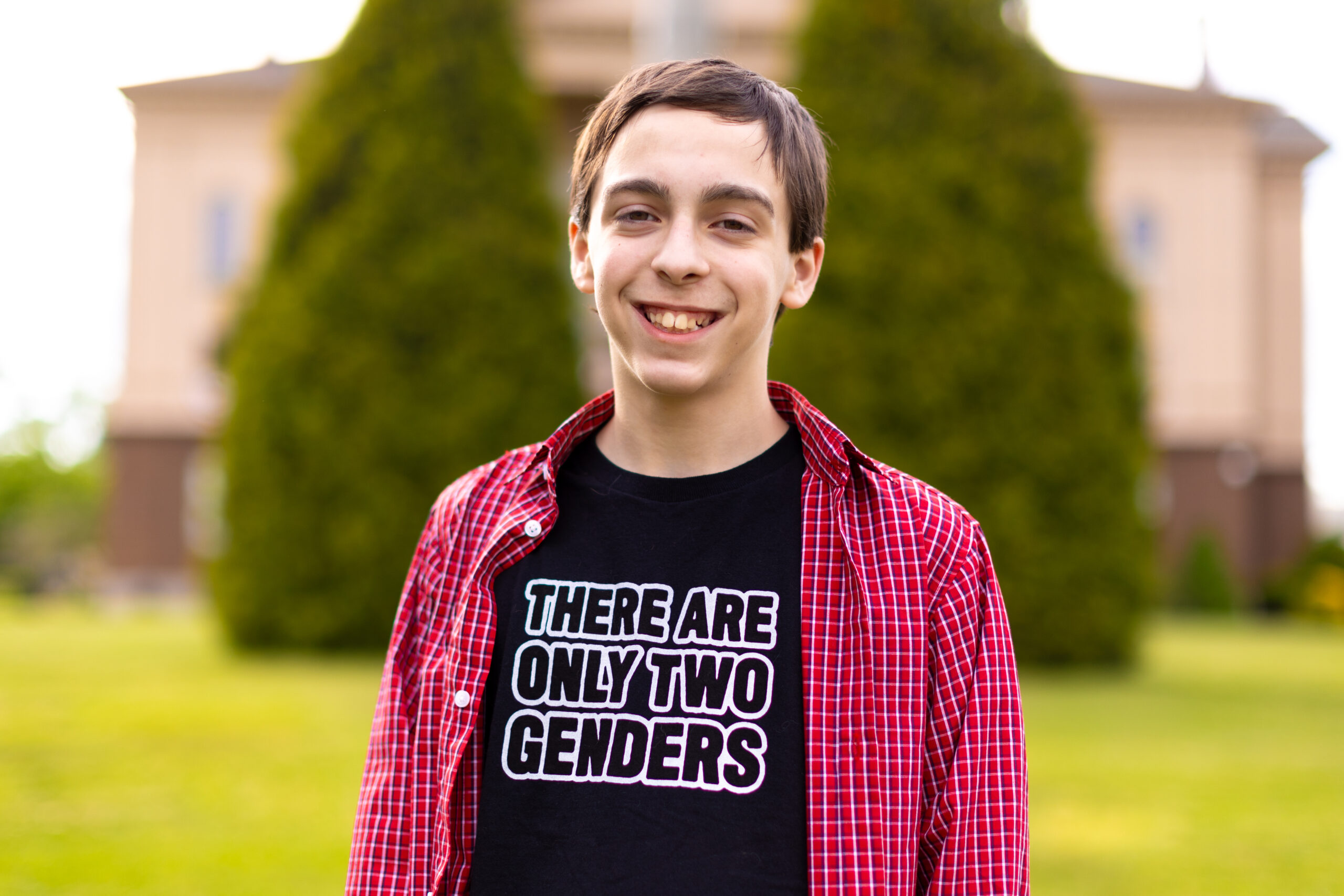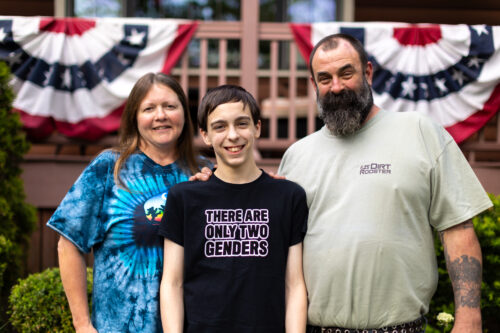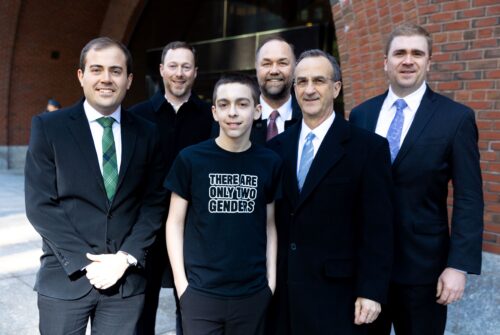Update – May 27, 2025: The U.S. Supreme Court has declined to hear Liam Morrison’s case. Read the press release.

It all started with a T-shirt.
When he was a 12-year-old student, Liam Morrison was punished by his school for wearing a shirt expressing his beliefs—and a basic scientific fact.
People around Liam were also speaking their minds, but he was the only one silenced for trying to add his voice to the conversation.
Liam wasn’t always this outspoken. But he knew he had to take a stand for his free speech rights.
Who is Liam Morrison?

Liam was born and raised in Middleborough, Massachusetts. Now a high schooler, he has been on the honor roll throughout his schooling.
Growing up, he was thoughtful and curious. His father nurtured that instinct, talking to Liam often about the news and current events, and even telling a few tall tales to make him think.
“When I was younger—when I was a lot more gullible—he would tell me these absurd stories and let me come to my own conclusions on whether or not they were true,” Liam said.
It was formative for young Liam, who credits those challenging conversations (and even the tales) with developing his ability to form his own opinions.
But in seventh grade, his opinions and good-natured curiosity led Liam to question the narrative on gender that his school promoted. School officials responded by sending him to the principal’s office—and eventually the courtroom.
Why did Liam speak up?

When he was a student at Nichols Middle School, Liam noticed a trend among the school administration and his peers: they increasingly viewed gender in a different way than he did. They saw it as a self-selected point on a spectrum instead of a fact determined by one’s biology.
On the bus to school, he had conversations with students who identified as transgender. The school campus was adorned with pride flags and posters professing gender ideology, and administrators promoted activities and celebrations geared around “Pride Month.”
But Liam had developed his own opinion, based on scientific reality: there are only two genders.
So he ordered a T-shirt.
Liam was silenced

He didn’t make it past first period in the T-shirt.
“There are only two genders,” the five words on his shirt, proved an uncomfortable message for administrators. The school principal pulled Liam out of the classroom and, along with the guidance counselor, instructed him to remove the shirt.
Polite but resolute, Liam held his ground.
“I just felt that taking off the shirt was unnecessary,” he said. “I didn’t want to back down.”
The principal and guidance counselor said he wouldn’t be allowed back in class until he removed the shirt.
He went home. But he didn’t stay quiet.
At the school board meeting the following week, Liam decided he would speak about his experience. “What did my shirt say?” Liam asked the board. “Five simple words. ‘There are only two genders.’ Nothing harmful, nothing threatening. Just a statement I believe to be a fact.”
He added, “I don’t complain when I see pride flags and diversity posters hung throughout the school. Do you know why? Because others have a right to their beliefs, just as I do.”
The school board didn’t respond—but soon, the country did.
Liam challenges the school

Someone had filmed Liam’s comments in defense of free speech at the school board meeting and posted them online. Overnight, Liam went viral.
He was connected with attorneys at Massachusetts Family Institute (MFI), which sent a letter to his school requesting that administrators allow Liam to wear his shirt. The school still said no.
Liam decided to wear the shirt again anyway—except, this time, he made some modifications. “There are [censored] genders,” read the updated text.
The school once again told him to remove the shirt. He realized it was time to take more serious action.
“If we’d let this slide, it would seem like I was willing to let someone tell me what I could and couldn’t say,” he said. “That’s against the entire reason the United States was made—it would go against our core values.”
Liam and his family enlisted the help of Alliance Defending Freedom to work alongside MFI and defend Liam’s right to speak freely about his beliefs.
Standing for his rights, all the way to the Supreme Court

In May 2023, attorneys with ADF and MFI filed a lawsuit challenging the school district for violating Liam’s First Amendment rights.
After the judge ruled against Liam, ADF appealed to the U.S. Court of Appeals for the 1st Circuit. But in June 2024, that court affirmed the lower court’s decision.
Liam decided to ask the U.S. Supreme Court to hear his case—because this was about more than a T-shirt.
Liam’s stand was about a student’s right to express his beliefs, even when they go against a school’s preferred narrative. That freedom isn’t lost when a student walks through the schoolhouse door.
Unfortunately, the Supreme Court declined to hear Liam’s case, ending his legal journey, over strong dissents by Justice Thomas and Justice Alito. But that doesn’t mean his courage went unnoticed.
Liam stood up for the values that this country was built upon, even when it wasn’t easy or convenient. He hopes others will be empowered to do the same.
“I’d like people to see that they can speak up about different issues,” Liam said. “You can share your views. And you shouldn’t be afraid.”
What now?

It was a long road for Liam, and even though it didn’t end how he had hoped, this is far from the end of the story. ADF will continue to defend the rights of students to speak freely on important issues of the day without government censorship.
But none of this would be possible without the generosity of partners like you.
We don’t charge clients like Liam a dime to represent them in court, thanks to financial support from our Ministry Friends.
When you give now, you help defend students from school censorship. Liam wasn’t the first student to have his free speech rights violated—and he won’t be the last.
Will you give today to advance free speech for all?





